- Home
- Terry C. Johnston
Ashes of Heaven (The Plainsmen Series) Page 3
Ashes of Heaven (The Plainsmen Series) Read online
Page 3
Samantha smiled at him as she began singing the words with the others in the room, shifting the blanket-wrapped bundle to her husband’s arms. The way she looked up at Seamus made him suddenly think on things he had long ago pushed to the back of his mind. Here and now he wished that his mother were still alive to know her grandson, to hold him …
Blessed Jesus, here are we,
Thy beloved word obeying.
How Seamus wished his mother had survived those years of blight and famine and black death in Ireland to reach this faraway land of Amerikay with her son and brothers. Countless times he hoped that she had joined him on that stinking ship instead of staying behind in the land of their birth.
Now this child doth come to Thee
As Thou biddest in Thy saying …
Then he wished her brothers could have been here to stand beside him too. Ian O’Roarke—far out there in Oregon country with his own family, a solid man given to little nonsense, a man firmly planted in his own ground as he had always wanted. And Uncle Liam … oh, Liam! That big, raucous, footloose leprechaun of a man. Buried now beside that nameless river where Forsyth’s fifty scouts had held out against better than five hundred of Roman Nose’s finest horsemen across nine blistering days.*
Let the little ones be given unto me;
Of such is the kingdom of heaven.
Seamus found himself gazing down at his son’s face as the others finished the song around them. With the boy cradled across his left arm, he slowly became aware that the singing had stopped, aware that the minister was speaking in silver tones to the gathering in that chilly log and plank house.
It had been so, so hard to decide upon a name for the child as Seamus rode south from the Tongue River battlefield where Colonel Nelson A. Miles had collided with Crazy Horse in battle.* Should he name this boy after his Uncle Liam, and perhaps curse the child for all the rest of his days with the same rootless wanderlust that drove Seamus’s uncle always to seek out what lay beyond the next band of hills? Or, should he name the boy after his Uncle Ian, a more solid, rooted, sensible sort? Back and forth, mile after endlessly cold mile Seamus had grappled with it as he plodded south toward the Powder River, south to Fort Fetterman, and finally to this reunion with his little family here at the army’s Laramie post.
He and Samantha hadn’t decided upon the name until late the night before the christening, after talking it back and forth and sideways all these days since Seamus had shown up on the hillside to the north of the fort. In the candle-lit closeness of their little room, their breath issuing in steamy vapors as they lay huddled beneath their mountain of blankets while the storm spent itself and the howling wind battered the sides of Old Bedlam, they had bent all the possibilities this way and that, front and back, until they both knew they had found the proper name for the child asleep beside them in his crib.
Colin Teig Donegan.
“A damned sight better than naming the wee lad after his father,” Seamus had snorted as he finally snuffed out the candle and closed his eyes, drawing her against him.
“Wouldn’t been so bad,” Sam had said quietly. “A strong son carrying on the name of his dear father. If you hadn’t come back, I was going to name him—”
“After me!” he interrupted. “A curse that’d been, woman!”
She playfully yanked a long strand of his hair that spilled across his shoulder as she nestled her cheek against his neck. “Proud he would have been, growing up to know who his father was.”
“It’s better this way,” he whispered at last in the frosty darkness, speaking his words against the tangle of her curls spilling beneath his chin like seafoam.
“Yes, ’tis better this way,” she answered. “I have my husband back in my arms. And our son has a name.”
Chapter 2
Hoop-and-Stick Game Moon
1877
BY TELEGRAPH
The Black Hills Treaty, Etc.
Washington, January 23.—The house committee on Indian affairs to-day agreed to recommend the passage of Seelye’s bill to ratify the arrangement made with the Sioux Indians by the United States commission last October, for the relinquishment of their title to the Black Hills country, etc.
Old Wool Woman took the offered tin cup, felt its warmth in her cold, bony hands, smelled its heady aroma and bent to sip the coffee, her eyes watching the handful of white men over the rim of her cup.
This wasn’t something the ve-ho-e* did to his prisoners, was it? Would these soldiers bring her here to drink strong coffee sweetened with the white sand only to torture and kill her?
It simply could not be, she convinced herself, studying the face of the Bear Coat, unless his eyes were a mask to what truly lay in his heart. Old Wool Woman could not believe the soldier chief had treachery in mind when he sent Big Leggings* to fetch her to this log lodge where a fire hissed and crackled in a metal box at the corner of the room. She and the other Ohmeseheso† prisoners had not wanted for warmth from the moment of their capture. Nor had they gone hungry. They had as much as they wanted to eat every day. Especially in the ten days since they had reached this collection of log lodges the soldiers had erected at the mouth of the Tongue River.
She let a smile grow inside her, thinking how much the young Black Horse ate of the soldiers’ food. And when he had finished the youngster always asked the other prisoners if they had any food they weren’t going to eat. He always cleaned everyone’s plates. Growing, just the way her young sons had grown when they were becoming young men like Black Horse.
For a moment Old Wool Woman felt a stab of pain where the smile had been, remembering. Suddenly thrust back in time to think of sons killed by ve-ho-e soldiers. Forced to recall how she lost her husband in battle against Three Finger Kenzie’s soldiers. Reflecting on her life as Sweet Taste Woman, raising babes and coupling with Black White Man, and wandering after the buffalo season upon season. That life was gone in the blink of an eye.
Now she was Old Wool Woman, her name changed because there was little left in her life that was sweet at all. Her name changed because all that she had managed to drag from their lodge the morning of Three Fingers Kenzie’s attack on their village was an old wool blanket. Grease- and blood-stained, smoked beside many fires, it became such a source of pride for her. Despite its crust of mud and ragged edges, it had sustained her through a terrible ordeal. It sustained her still.
She sipped her coffee and glanced at Big Leggings, the one her people called “White” because of the half-breed’s fair complexion. Word in the camps of the Crazy Horse people was that he was a traitor to Buffalo Bull Sitting Down*
The previous autumn while the Hunkpapa hunted buffalo, Big Leggings had been living with the Lakota warrior bands, interpreting for Buffalo Bull Sitting Down when the Bear Coat brought his soldiers after them to fight. But something soon made Big Leggings abandon the Hunkpapa and run off to join the soldiers. Besides speaking the white man’s tongue, the half-breed spoke good Lakota, and also managed to make himself crudely understood in the language of the Shahiyela. On their trip north from the fight at Belly Butte, Big Leggings would mix his Shahiyela and Lakota when he talked with her and the other prisoners. But it did not matter to Old Wool Woman. She understood as much Lakota as Big Leggings did. For a long time her people had remained close to the Oglalla: camping, hunting and fighting together, intermarrying, raising families in both camps.
That was why Crazy Horse had managed to hurt so many of the survivors of the fight with Three Fingers Kenzie when they came looking for him. Behind their hands many still whispered how the Oglalla war chief might as well have turned them away. Without compassion, he had told the Shahiyela survivors his Lakota people did not have enough for themselves. Besides, Crazy Horse had explained, it was plain to him that the soldiers were hunting down the Shahiyela, not the Lakota.
Wasn’t it true that theirs was the first village the soldiers had struck back in the Light Snow Moon?†
And weren’t the Shahiyela l
eading the villages when the Long Hair’s soldiers attacked them on the Greasy Grass? In fact, didn’t the fiercest of the fighting occur directly across the river from the Ohmeseheso village?
Wasn’t it true-that Three Stars Crook sent Three Finger Kenzie to destroy the Shahiyela in the White Mountains? So wasn’t it clear to everyone, Crazy Horse demanded, that the soldiers were making war on the Shahiyela?
Suddenly the Bear Coat was talking as he arose from behind the big wood box covered with a profusion of flat pieces of thin white parfleche, each adorned with long lines or strange picture writing, scratched upon their surface. He went to the fire-box in the corner of the room and poked in a long twig. He lit his pipe and turned back to look at Old Wool Woman.
When the soldier chief finished speaking, Big Leggings stood and dragged over the three-legged stool he was sitting on. He placed it closer to her and settled himself as she watched him intently for any signs of betrayal. She was alone here. The two other women were back with the children tonight. As she looked into Big Leggings’s eyes, Old Wool Woman said a quick prayer to the Everywhere Spirit that she would return to the other prisoners when the soldiers were done with her. She prayed that even if these ve-ho-e beat her, abused her, they would not kill her.
“The Bear Coat had me bring you here because you are the oldest,” Big Leggings explained, speaking haltingly in her tongue.
“Is it easier for you to speak Lakota?” she asked after swallowing her coffee.
“Most times,” he grinned at her. “As long as you understand what I say, and I know what you say to me, we can talk.”
She glanced at the other soldiers, then brought her eyes back to the half-breed. “If I am the oldest, why am I here?”
“The Bear Coat hopes that you will understand … because you are the oldest.”
“Understand?”
“The soldier chief does not want to fight the Shahiyela.”
Remembering the words of Crazy Horse, Old Wool Woman asked, “Are you saying the Bear Coat’s soldiers want only to fight the Lakota?”
“No,” and he shook his head. “The Bear Coat does not want to fight any of the warrior bands. If they would come here to surrender, he would not go looking for them. He does not want any harm to come to the Shahiyela. He wants to make peace with them.”
When Big Leggings paused, the Bear Coat spoke as he warmed his hands over that fire in the metal box. The interpreter turned back to Old Wool Woman.
“The soldier chief wants to ask you if there is any way you can help bring the Shahiyela in to this soldier fort peacefully so that no harm will come to them.”
“May I have more coffee?”
Big Leggings grinned and stood, turning to the stove for the big, blackened pot. She was already thinking, surprised to find that she wanted to help the Bear Coat, to help the ve-ho-e who had killed her sons and husband. It surprised her to be sitting here among these soldiers, the one they asked for help.
Old Wool Woman took back the cup and waited as the interpreter heaped more of the sweet grains into her coffee then stirred it for her. She watched the small metal spoon go round and round in the cup, causing the black liquid to go round and round with it. She wistfully thought of her lodge, round as that cup, missing it and the life she had lived with Black White Man. Unlike the Shahiyela, the white man lived in a square world. Her people lived in a round world. Slept in a round lodge …
“In our village,” she suddenly blurted, her eyes boring into his, “there is a lodge where all men are safe.”
“All men,” he repeated, “No matter if they are white?”
“All men, no matter if they are enemy or not.”
Big Leggings squatted before her and licked the spoon he had used to stir her coffee. “Tell me of this lodge.”
“It stands at the center of the camp crescent. It is a powerful place. A medicine lodge. It belongs to the keeper of Esevone.”
“Ese … vone?” he echoed.
“The Sacred Buffalo Hat.”
“I have heard of it. Tell me how this hat can help.”
Old Wool Woman explained, “If there is fighting in the village, and an enemy jumps inside the door of this lodge, the fighting will stop. He is safe inside the lodge.”
Big Leggings’s eyes grew large. He looked at the Bear Coat and nodded eagerly. “Go on!” he said to her.
“Once that enemy is inside this sacred lodge, the keeper of the hat will perform the peace ceremony. The Sacred Hat Priest and the Old Man Chiefs will smoke the pipe with him. Peace is made through smoking the pipe, for the pipe never fails. It is a prayer made to the Everywhere Spirit.”
The interpreter immediately turned to chatter in the white man’s tongue to the Bear Coat. As she watched the soldier chief’s face, Old Wool Woman saw him smile behind his dark beard, saw his eyes turn to her. He looked pleased with her news.
“The Bear Coat is very, very pleased,” the interpreter said to her. “This is the way we will have a chance to talk to your chiefs and tell them of the soldier chief’s wish to have peace.”
“You and the Bear Coat are going to find my people’s village and slip inside the Sacred Hat Lodge?”
He wagged his head and explained slowly in her tongue. “When I say we, I do not mean me and the Bear Coat. I mean you and me. The Bear Coat is sending you and me to find your village. He wants us to take along presents: coffee, and lots of sugar, dried fruit, bacon and beans.”
“And tobacco?”
Big Leggings nodded enthusiastically. “Yes, lots of tobacco.”
“This is good,” she told the interpreter, feeling a little nervous. “The warrior camps have not had any tobacco for a long, long time now.”
Old Wool Woman sipped her coffee while Big Leggings and the Bear Coat talked with the others. She watched the smiles on their faces, their animated eyes, the excited tone of their foreign words as they talked to one another. She did not have to understand their tongue to know that what she had told these ve-ho-e was very, very good news.
Perhaps she really could do something to help her people. War had brought them only devastation and poverty, wandering and death. Perhaps she would be that instrument the Everywhere Spirit would use to bring about a just peace with the soldiers so that no more of her people had to die.
Big Leggings turned suddenly and gripped her thin, bony hands between his. Her coffee cup trembled, not from fear, but from a keen, ready anticipation. She saw the expectation firing the interpreter’s eyes. Yes, Old Wool Woman did indeed tremble from her own mounting excitement.
“Will we go soon?” she asked.
“Four, perhaps five, days. And when we find the Shahiyela camp,” Big Leggings told her, his deep voice rising, “it is a matter of life or death that you help me find that Sacred Hat Lodge!”
* * *
The Lakota wolves had returned after many days of trailing the Bear Coat’s soldiers back to their fort. Day after day the ten scouts, mounted on the strongest horses left among the warrior camps, had watched for a chance to slip in close enough to free the captives. Instead, the warriors could only watch the soldiers reach their fort at the mouth of the Buffalo Tongue River with their prisoners. They had little choice but to turn back for the village with empty hands and small hearts.
The Mnikowoju* chief watched the ten slowly crossing an icy Prairie Dog Creek on their weary animals as small, icy flakes danced around them. They did not ride like victors. They looked every bit as whipped and weary as their ponies. There were only ten riders. No others. The Bear Coat still held the Shahiyela.
So much had taken place while those ten riders had been gone. Across four days Sitting Bull, Crazy Horse, and the other Lakota chiefs sat in council with Shahiyela leaders, men like Morning Star and Little Wolf, Two Moon and Old Bear, the Sacred Hat Priest. Each day they smoked and passed the pipe and talked until the sun had run its winter race across the sky. And in the end two things grew certain.
Despite what Sitting Bull had managed t
o trade from the Red River Slotas after the Bear Coat’s soldiers had twice attacked his people, there were not enough guns and bullets to wage war on the wasicu as they had the previous spring and summer.
Just as certain, no longer was there the same united resolve among the warrior bands, the resolve that Sitting Bull once had tapped within each fighting man, the resolve that once made them rise up and make a stand whereas before they had only raided, skirmished, and fought long enough for the villages to escape.
It disgusted Lame Deer the way his old friends dithered and deliberated over what, to him, was not worth argument. It angered him because there really was but one path to take. While Sitting Bull, No Neck, and others talked of fleeing north into the Land of the Grandmother, Crazy Horse and the rest discussed marching south when the weather broke, so they could slip back onto the reservations.
The Grandmother’s soldiers would treat them squarely, Sitting Bull’s allies said. There would be buffalo. The camps would be left in peace north across the Medicine Line.
But winter stays long in that far place, others protested. Even the summer days can be cool, and the nights wet. Besides, the Land of the Grandmother had never been our land. No matter how many Lakota go there, it never will be our land.
Why are you arguing this way? Lame Deer wanted to yell. Couldn’t the other chiefs see that there was really only one choice?
In the end it deeply saddened him that none of the other leaders could see that there was a third path open to them. They did not have to flee to a faraway land where they were unwelcome strangers. And they did not have to slip back onto the agencies with their tails tucked between their legs just because the women were hungry and the children were sick.
A warrior did not give up!
“As for me,” Lame Deer announced after Sitting Bull had declared he would leave in the morning for the Land of the Grandmother, “neither path you have offered suits my Mnikowoju people. Any lodge, any warrior from any camp who wishes to join me may come with us. We are not giving up, no matter what the wasicu might promise us—because we all know his promises are like dust in a strong wind.”

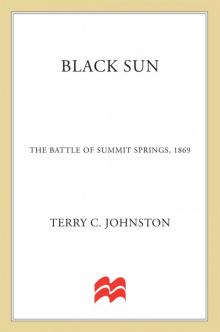 Black Sun, The Battle of Summit Springs, 1869
Black Sun, The Battle of Summit Springs, 1869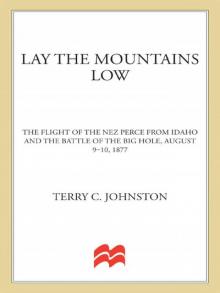 Lay the Mountains Low
Lay the Mountains Low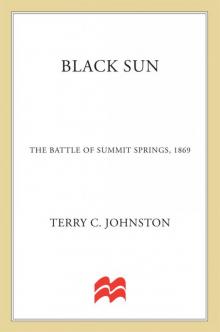 Black Sun: The Battle of Summit Springs, 1869 (The Plainsmen Series)
Black Sun: The Battle of Summit Springs, 1869 (The Plainsmen Series)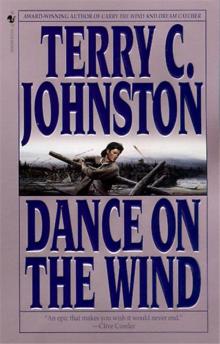 Dance on the Wind tb-1
Dance on the Wind tb-1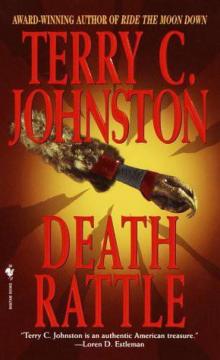 Death Rattle tb-8
Death Rattle tb-8 The Stalkers
The Stalkers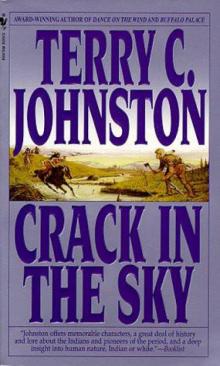 Crack in the Sky tb-3
Crack in the Sky tb-3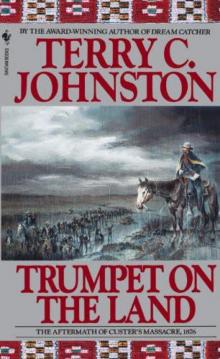 Trumpet on the Land: The Aftermath of Custer's Massacre, 1876 tp-10
Trumpet on the Land: The Aftermath of Custer's Massacre, 1876 tp-10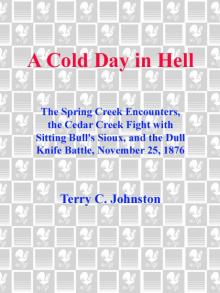 A Cold Day in Hell
A Cold Day in Hell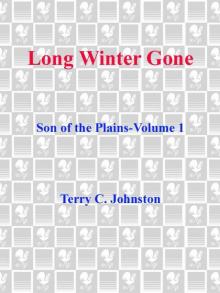 Long Winter Gone: Son of the Plains - Volume 1
Long Winter Gone: Son of the Plains - Volume 1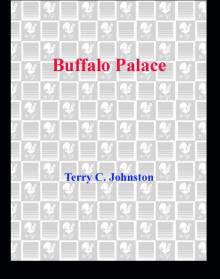 Buffalo Palace
Buffalo Palace Cries from the Earth
Cries from the Earth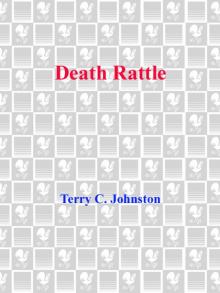 Death Rattle
Death Rattle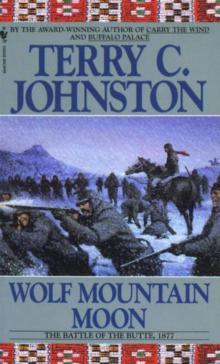 Wolf Mountain Moon: The Battle of the Butte, 1877 tp-12
Wolf Mountain Moon: The Battle of the Butte, 1877 tp-12 Crack in the Sky
Crack in the Sky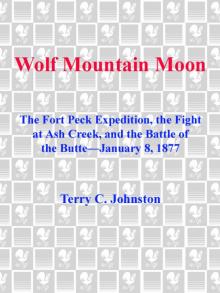 Wolf Mountain Moon
Wolf Mountain Moon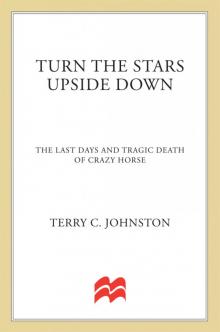 Turn the Stars Upside Down: The Last Days and Tragic Death of Crazy Horse
Turn the Stars Upside Down: The Last Days and Tragic Death of Crazy Horse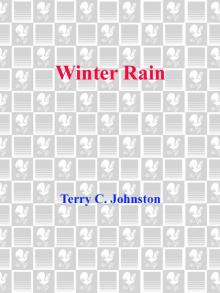 Winter Rain
Winter Rain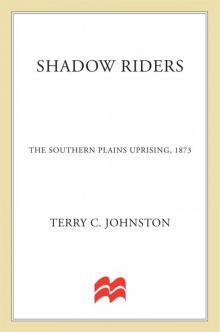 Shadow Riders: The Southern Plains Uprising, 1873 (The Plainsmen Series)
Shadow Riders: The Southern Plains Uprising, 1873 (The Plainsmen Series)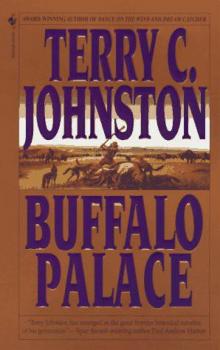 Buffalo Palace tb-2
Buffalo Palace tb-2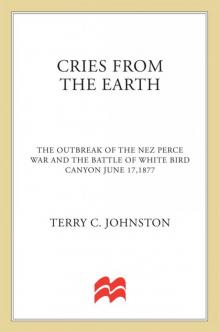 Cries from the Earth: The Outbreak Of the Nez Perce War and the Battle of White Bird Canyon June 17, 1877 (The Plainsmen Series)
Cries from the Earth: The Outbreak Of the Nez Perce War and the Battle of White Bird Canyon June 17, 1877 (The Plainsmen Series)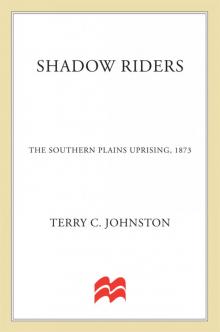 Shadow Riders, The Southern Plains Uprising, 1873
Shadow Riders, The Southern Plains Uprising, 1873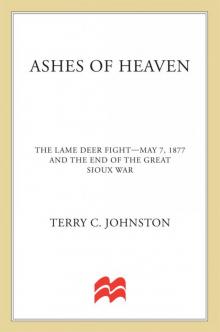 Ashes of Heaven (The Plainsmen Series)
Ashes of Heaven (The Plainsmen Series)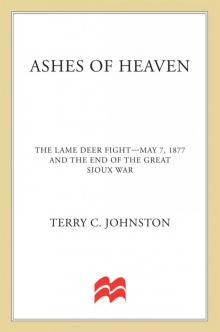 Ashes of Heaven
Ashes of Heaven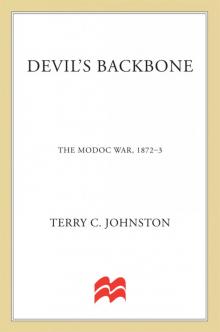 Devil's Backbone: The Modoc War, 1872-3
Devil's Backbone: The Modoc War, 1872-3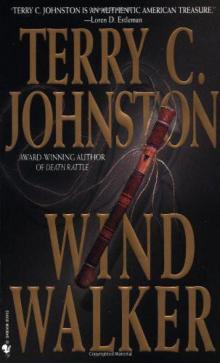 Wind Walker tb-9
Wind Walker tb-9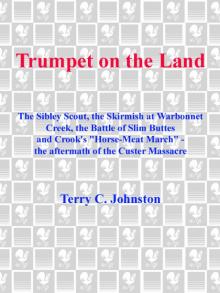 Trumpet on the Land
Trumpet on the Land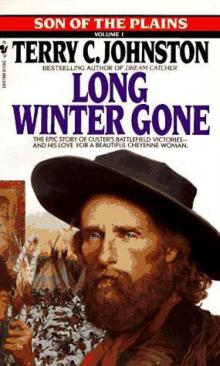 Long Winter Gone sotp-1
Long Winter Gone sotp-1 Dying Thunder
Dying Thunder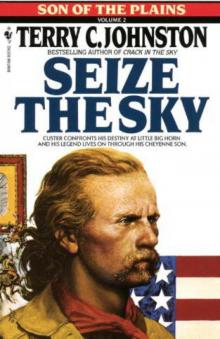 Seize the Sky sotp-2
Seize the Sky sotp-2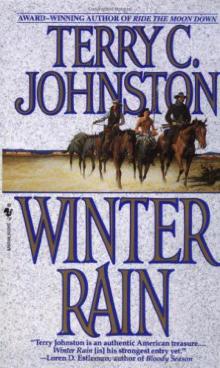 Winter Rain jh-2
Winter Rain jh-2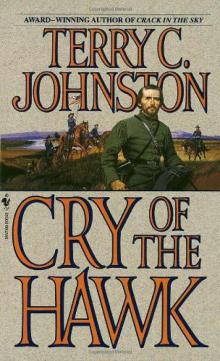 Cry of the Hawk jh-1
Cry of the Hawk jh-1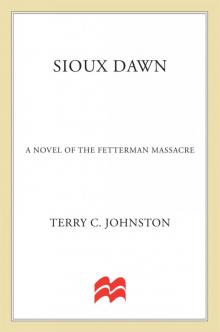 Sioux Dawn, The Fetterman Massacre, 1866
Sioux Dawn, The Fetterman Massacre, 1866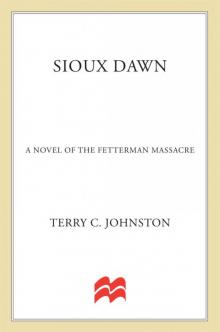 Sioux Dawn: The Fetterman Massacre, 1866 (The Plainsmen Series)
Sioux Dawn: The Fetterman Massacre, 1866 (The Plainsmen Series)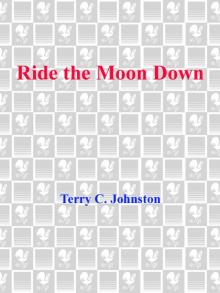 Ride the Moon Down
Ride the Moon Down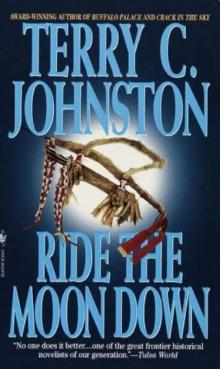 Ride the Moon Down tb-7
Ride the Moon Down tb-7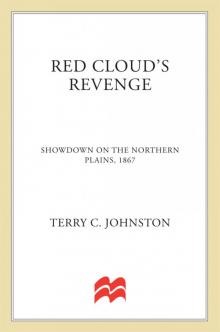 Red Cloud's Revenge
Red Cloud's Revenge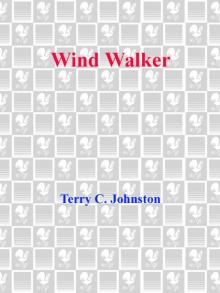 Wind Walker
Wind Walker